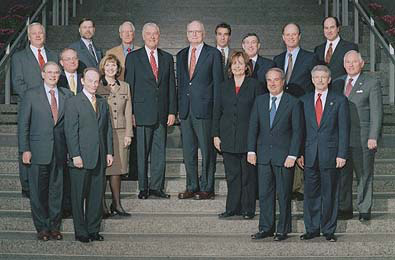The last
comprehensive review of U.S. ocean policy
was conducted thirty-five years ago by the Stratton Commission.
Since then our nation’s
oceans and coasts have changed drastically.
More than 37 million people, 19 million
homes, and countless businesses have
been added to coastal areas. Marine transportation and coastal recreation
and tourism have become two of the top drivers of the national economy.
These developments, however, come with costs, and we are only now
discovering the extent of those costs in terms of depleted resources,
lost habitat, and polluted waters.
When
Congress passed the Oceans
Act of 2000 (P.L. 106-256), it acknowledged the significance of the oceans
and coasts to this country. Pursuant to the act, the President appointed 16
members from diverse backgrounds to the U.S. Commission on Ocean Policy. The
Commission’s
mandate was to establish findings and develop recommendations for a new and
comprehensive national ocean policy.
The Commission
began its work in September 2001 with a series of nine
regional meetings and 18 additional site visits in every coastal region
of the country and the Great Lakes. The Commission heard testimony from 445
experts, including many of the nation’s top ocean scientists and researchers,
environmental organizations, industry, citizens, and government officials,
as well as receiving written testimony from countless others. It was the most
comprehensive and thorough review ever conducted of our nation’s oceans
and coasts.
After
significant thought, careful deliberation, consultation with its Science
Advisory Panel, and the consideration of a wide range of potential
solutions, the Commission released its Preliminary
Report on April 20, 2004, for review by the nation’s Governors and
other stakeholders.
The Commission’s preliminary recommendations created a framework
for a national ocean policy that effectively and efficiently preserves
and utilizes our nation’s oceans and coasts and their resources.
To view a video summary of the Preliminary Report, click
here.
On September 20, 2004, the Commission submitted its Final Report
to the President and Congress, An
Ocean Blueprint for the 21st Century.
On December
19, 2004, the Commission officially expired, as called for
under the, Oceans Act of 2000 (P.L. 106-256).
Meet
the Commissioners
This
page provides biographies of the 16 commissioners.
Commission Staff
This page lists staff and provides individual e-mail links.
Science Advisory Panel
The U.S. Commission on Ocean Policy established the Science Advisory Panel in February 2002. The panel, as mandated by the Ocean Act of 2000, provided expert scientific counsel and assistance to the Commission as it developed findings and recommendations for a new, comprehensive national ocean policy.
Commission
Working Groups
In
the course of its work, the Commission established four Working
Groups to address issues in the areas of Governance; Research,
Education and Marine Operations; Stewardship; and Investment and
Implementation. These Working Groups were charged with reviewing
and analyzing issues within their specific area of focus and reporting
on their findings to the full Commission. The Working Groups were
phased out when the Commission began its public deliberation meetings
in November 2002.
 |
|
The
U.S. Commission on Ocean Policy- (l-r) front
row: Professor Marc
J. Hershman; Dr. Thomas R. Kitsos (Executive Director); Mr.
Ted A. Beattie; and Dr. Paul A. Sandifer. Second row: Mr. Lawrence
Dickerson; Mrs. Lillian Borrone; Ms. Ann D'Amato; and Mr. Paul
L. Kelly. Back row: Mr. Christopher Koch; Mr. Edward B. Rasmuson;
Dr. James M. Coleman; Admiral James D. Watkins, USN (Ret.)
(Chairman); Mr. William D. Ruckelshaus; Dr. Andrew A. Rosenberg;
Vice Admiral Paul G. Gaffney II, USN (Ret.); Dr. Robert Ballard;
and Dr. Frank Muller-Karger.
|
(
top)

